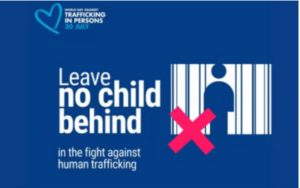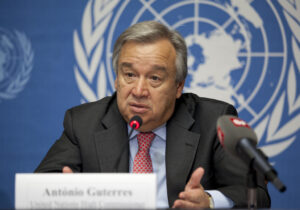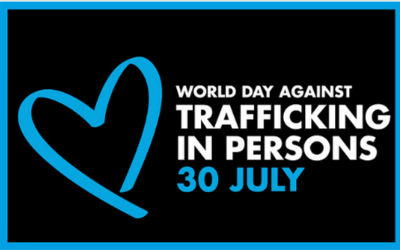 Each year on 30 July, we observe World Day Against Trafficking in Persons. This year’s theme is
Each year on 30 July, we observe World Day Against Trafficking in Persons. This year’s theme is
“Leave No Child Behind* in the Fight Against Human Trafficking”.
Marking the World Day Against Trafficking in Persons is crucial. It not only raises awareness about this grievous issue but also reinforces our collective commitment to combating human trafficking in all its forms. Through our prayers and actions, we can support survivors and work towards a world free from exploitation and trafficking.
This year’s global campaign focuses on the vulnerability of children and urges accelerated action to end child trafficking. Children are subjected to various forms of trafficking, including exploitation in forced labor, criminality or begging, trafficked for illegal adoption, and online and sexual abuse and exploitation. According to the UNODC’s Global Report on Trafficking in Persons, one in three victims of human trafficking is a child. Based on the current estimate of 49 million people are trafficked or enslaved this means that 16.3 million of them are children. By definition Human Trafficking is:
The recruitment, transportation, transfer, harbouring or receipt of people through force, fraud or deception for exploitation. In every region of the world, traffickers exploit vulnerable women, girls, men, and boys of all backgrounds for profit.
Traffickers often use violence, blackmail, emotional manipulation, removal of official documents, fraudulent employment agencies, and fake promises of education and job opportunities to trick and coerce their victims. Whatever the means the result is the same, human beings lose their rights and identity and are used and abused, and it is a global problem, an industry not far behind drugs and arms in terms of profit for traffickers.
Trafficked people are forced to work, often doing hard labour or prostitution, for no reward and are warned of terrible punishments if they escape, and often they are taken to unfamiliar countries where they don’t know the language and have no way of getting help, some die and are never heard of again by their families and communities.  Below is UN Secretary-General António Guterres’ message for the World Day against Trafficking in Persons 2024:
Below is UN Secretary-General António Guterres’ message for the World Day against Trafficking in Persons 2024:

Human trafficking is a horrific crime that targets the most vulnerable in our societies. On this World Day Against Trafficking in Persons, we focus on the most vulnerable among us — children.
Children account for one third of trafficking victims, suffering unspeakable abuse, whether they are forced into labour, sold off as brides, recruited as soldiers or coerced into criminal activities. Rising inequalities and globalization have fuelled complex trafficking networks that challenge traditional legal frameworks, creating new forms of slavery. Online platforms further expose children to sexual exploitation and gender-based violence and allow traffickers to exploit victims across borders.
The physical and psychological scars of these crimes persist long into adulthood, robbing them of their innocence, futures and fundamental rights. We must strengthen protection responses — including child-sensitive justice mechanisms, raise awareness, support unaccompanied children on the move, provide care for survivors and tackle the root causes of exploitation by helping vulnerable families.
I call upon Governments, civil society and the private sector, including tech companies, to intensify their efforts and collaboration so that no child is victimized and no trafficker goes unpunished. On this day, let us renew our commitment for a future where every child is safe and free.
*“Leave no one behind” is the central, transformative promise of the 2030 Agenda for Sustainable Development and its Sustainable Development Goals (SDGs).

